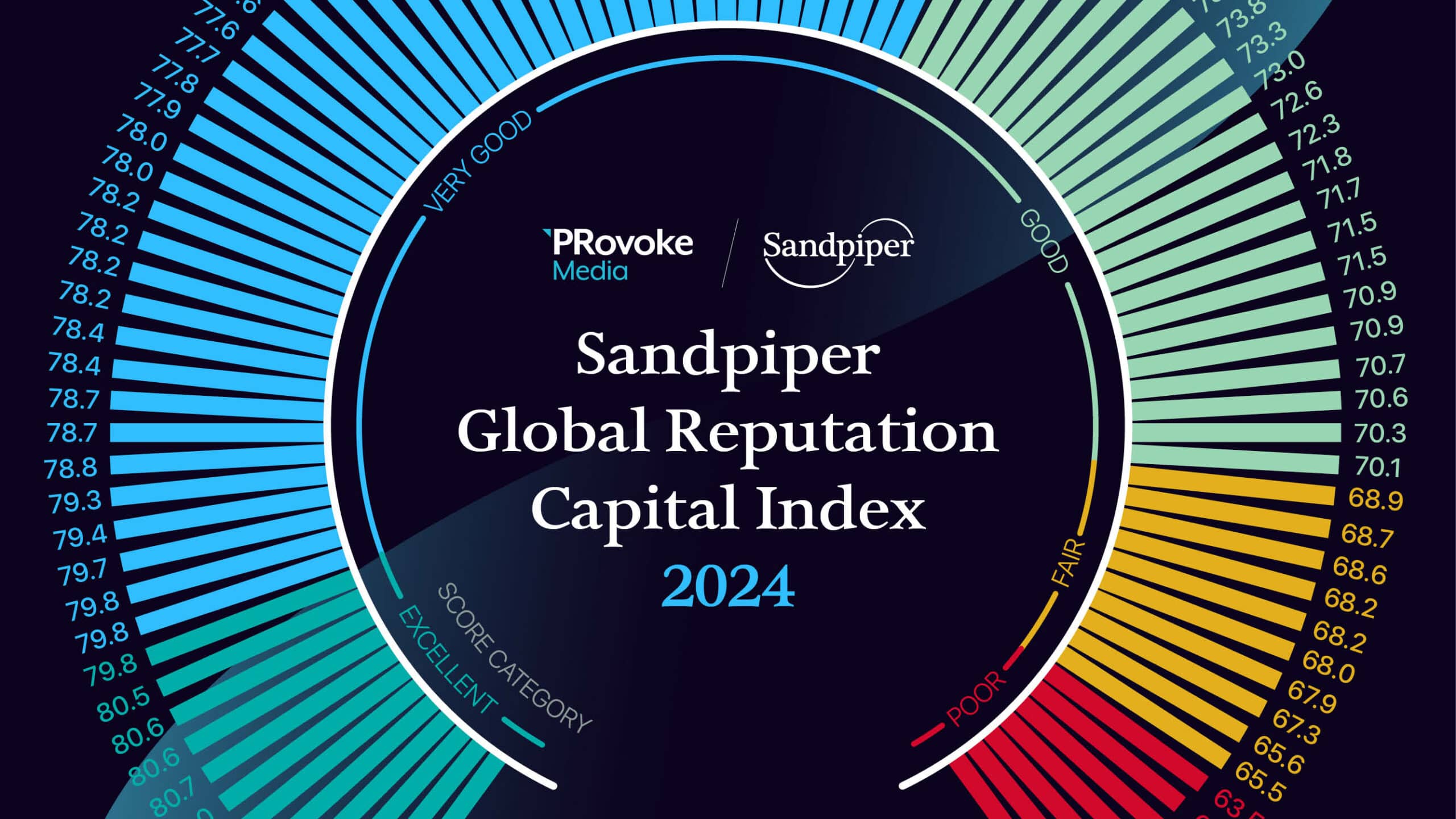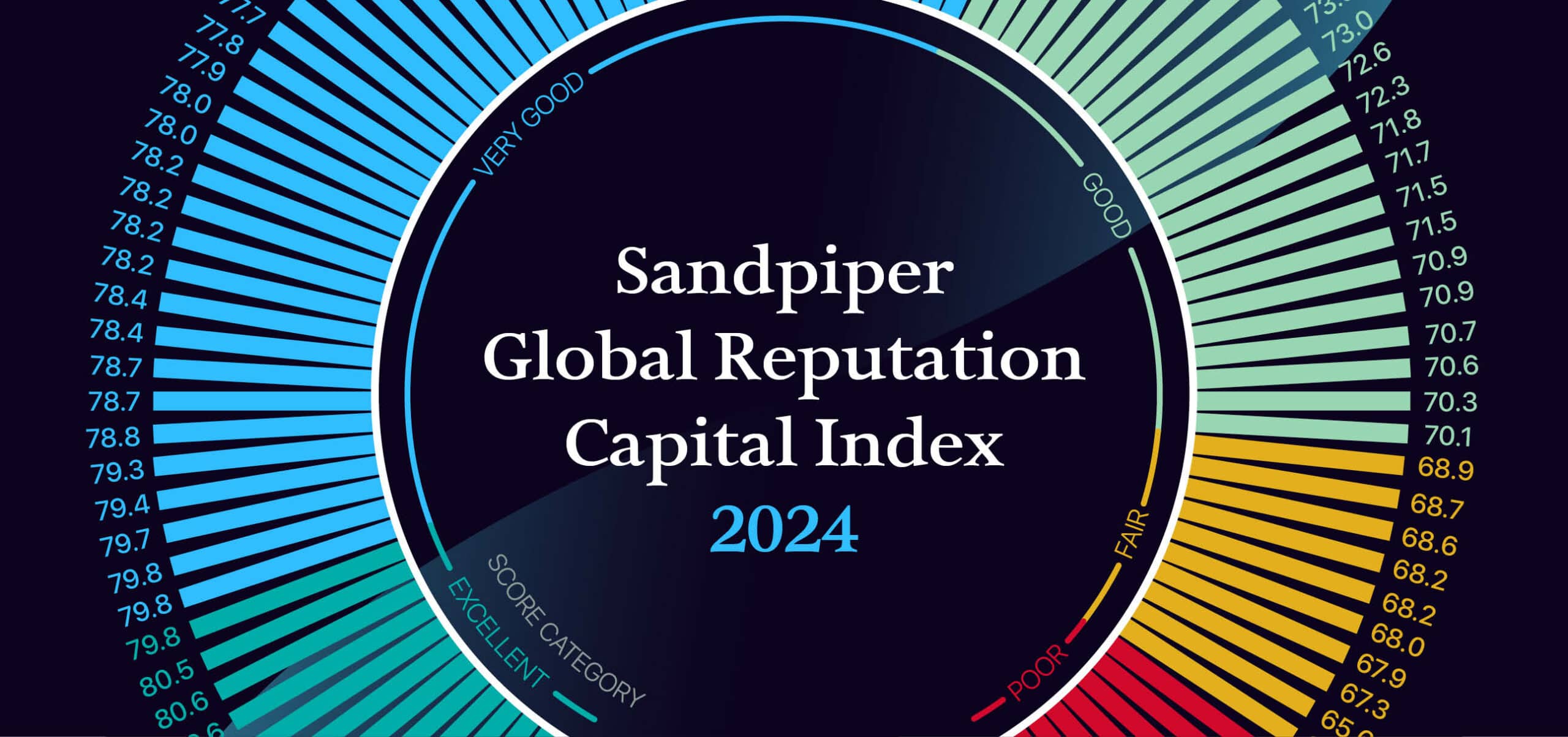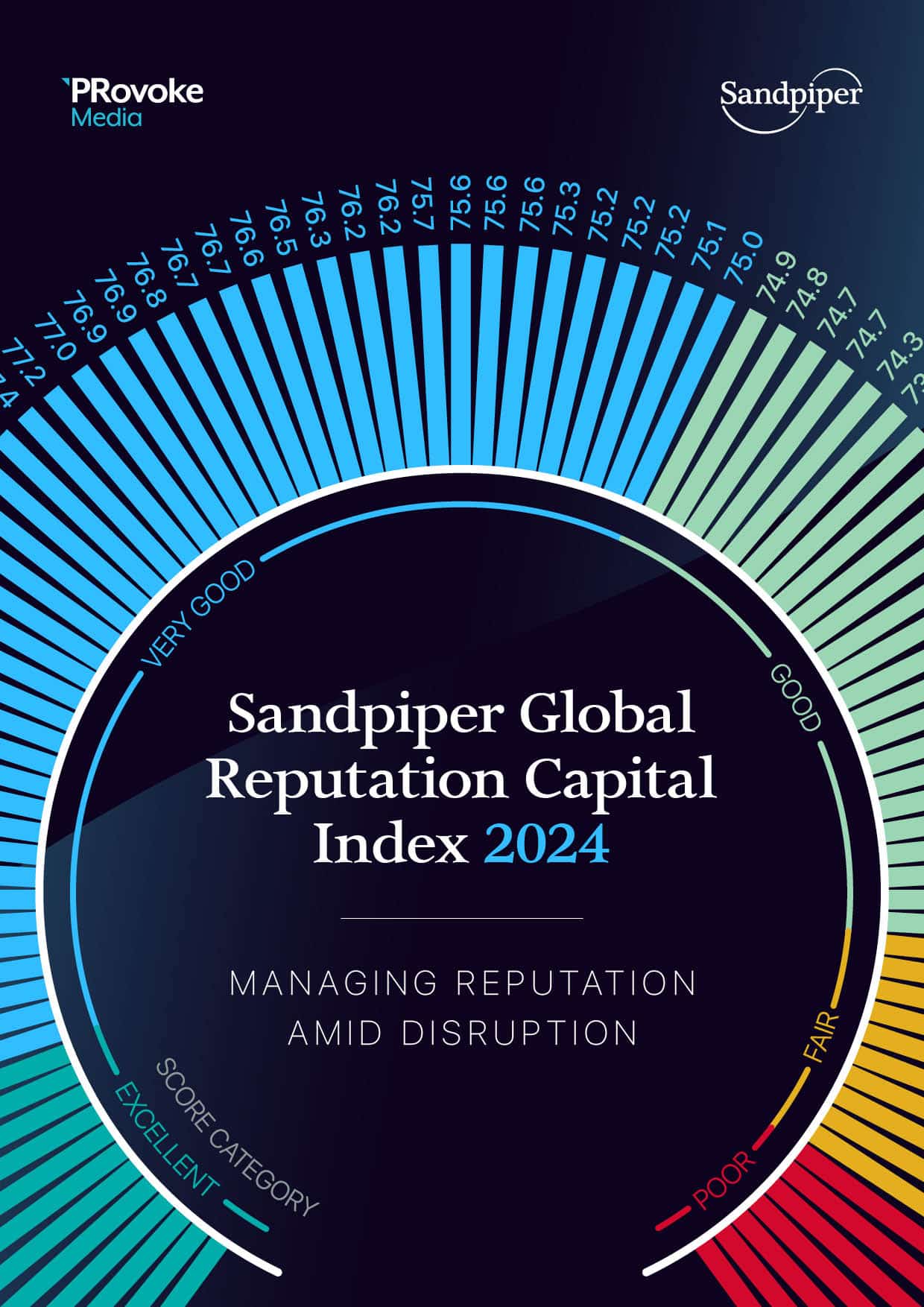
Sandpiper Global Reputation Capital Index 2024 Launch Events

Sandpiper Appoints Joan Ng to Advise in its Financial and Sustainability Practices in Singapore
Organisations Score Lowest for ESG and Sustainability Performance in New Sandpiper Reputation Capital Index
September 2024
- 72% of organisations negatively impacted by reputational weaknesses over past 12 months
- Majority (57%) of leaders say reputation is becoming more difficult to manage
- Only 12% of global organisations are recognised in top category for reputation management
- 97% of global leaders believe reputation is crucial for commercial success
- 57% planning to increase investment in reputation management strategy
19 September 2024, Singapore – A new report launched today by global reputation and policy management firm, Sandpiper, reveals ESG and sustainability to be the weakest area of reputation management for organisations globally, with only 9% making the leading category in this area.
The Sandpiper Global Reputation Capital Index, which is based on data from a survey of over 2,700 C-Suite Leaders across 27 markets, identifies four categories for performance in reputation management through analysis of nine areas of reputation management. Based on this, just 12% globally qualify as Trailblazers, with the remaining categorised as Aspirants (54%), Followers (32%), and Beginners (3%).
Reputation Strategy and Crisis & Issues Management are the Indexed areas with the highest portion of Trailblazers, while ESG & Sustainability Strategy, Executive Profiling & Thought Leadership, and Media Engagement have the lowest.
ESG and Sustainability Presents Significant Weak Spots
While progress in ESG and sustainability is rated as an important reputational area by 83% of respondents, only 39% self-rate their organisations as strong in this. Based on the Index, only 9% qualify as Trailblazers, the lowest of any area, with Followers at 36% and Beginners at 34% – the highest percentage of Beginners in any area.
This result is underpinned by multiple weaknesses. Less than half of respondent organisations have a sustainability and/or ESG strategy or targets, and only 44% are regularly producing any form of sustainability and/or ESG reporting at least annually. Resources is identified as a key barrier, with only 13% have a dedicated sustainability and/or ESG team.
| Global % implemented | |
| Sustainability and/or ESG strategy | 47% |
| Sustainability and/or ESG targets | 49% |
| Regular sustainability and/or ESG reporting, at least annually | 44% |
| Dedicated sustainability and/or ESG team | 13% |
The quality of organisational ESG and sustainability communications is also raising concerns, with 43% saying they don’t believe these are even accurate. Further to this, climate communications fares poorly, with only 29% having established a climate communications strategy. Less than half (45%) also say their organisations’ sustainability strategies are strongly aligned with the United Nations Sustainable Development Goals (SDGs).
Emma Smith, Sandpiper, CEO, said, “Amid increasing sustainability issues globally and as we approach the mid-point of the decade of action, the findings are clear that more needs to be done to advance sustainability goals. As stakeholder activism grows and greenwashing regulations increase, organisations that are unprepared risk being caught off guard and experiencing major reputational damages.”
Reputational Weaknesses Exposed as Risks Rise
In further findings, nearly three quarters (72%) of respondents’ organisations were negatively impacted by reputational weaknesses over the past 12 months. These included affecting the ability to do business with customers (61%), to attract and retain talent (54%), to recover from a crisis (54%), incurring financial losses (53%), as well as negatively impacting government and community relationships (51%).
These effects are being felt amid a growing risk landscape, with 56% saying reputation is becoming more difficult to manage, with just 21% saying it is becoming easier.
Nine out of 10 leaders are very concerned about a range of emerging reputational risks, including misinformation and disinformation (97%), data privacy and cybersecurity (96%), employee, customer and stakeholder activism (95%), DE&I prioritisation (95%), ESG and sustainability scrutiny (95%), geopolitical tensions (95%), impact of AI on communications (95%), and greenwashing claims (94%), and media consolidation (94%).
Despite the strong concerns, less than four out of 10 leaders feel well prepared to manage any of these issues. The rise of misinformation and disinformation (67 pt gap), employee activism (67 pt gap), geopolitical tensions (66 pt gap), and greenwashing top the list, indicating a need for immediate attention in these areas. Trailblazers outperform in every category of reputation management, including being 25 points below the global average in negative impacts owing to reputational weaknesses.
| Global % very concerned | Global % highly prepared | Global delta (percentage points) | |
| Impact of AI on Communications | 95% | 38% | 57pts |
| Rise of mis- and disinformation | 97% | 30% | 67pts |
| Stakeholder and customer activism | 95% | 33% | 62pts |
| Employee activism | 95% | 28% | 67pts |
| Increased ESG and sustainability scrutiny | 95% | 32% | 63pts |
| Greenwashing claims | 94% | 28% | 66pts |
| Prioritisation of DE&I | 95% | 33% | 62pts |
| Media consolidation | 94% | 30% | 64pts |
| Data privacy and cybersecurity issues | 96% | 36% | 60pts |
| Rising geopolitical tensions | 95% | 29% | 66pts |
Emma Smith, Sandpiper, CEO, said, “As the risk landscape increases and communications channels are increasingly fragmented and complex, the rules of reputation management have changed. Business leaders need to employ a holistic and multi-dimensional approach to reputation management that hyper-targets stakeholders, all while navigating emerging digital risks that have the potential to destroy reputations in seconds. In this environment, visibility, accountability, and transparency are the crucial ingredients for success.”
Strategy to Action Gap
Overall, the Index reveals a significant gap between strategy and action. While 97% of leaders believe having a good reputation is important for their organisation’s commercial success, and over 80% see all nine areas of reputation management as important, less than half rate their organisation’s performance as strong in any of these areas.
At the same time, leaders feel somewhat disempowered in reputational matters, with only 67% of CEOs and 50% of Corporate Affairs Leaders feeling a high level of responsibility for their organisation’s reputation. Over half also lack strong access to critical audience and stakeholder insights, which directly impacts their ability to engage and influence.
These issues appear to be recognised, with over 70% planning to increase investment in each area of reputation management over the next year.
Emma Smith, Sandpiper, CEO, said, “While our Index shows some very good signs of progress in reputation management globally, there area still many areas for improvement. A significant strategy to action gap is a consistent theme throughout the data, which shows that organisations have all the right intentions but are failing to mobilise plans. The appetite to increase investment in resources for reputation management efforts in the coming year is a positive sign.”






